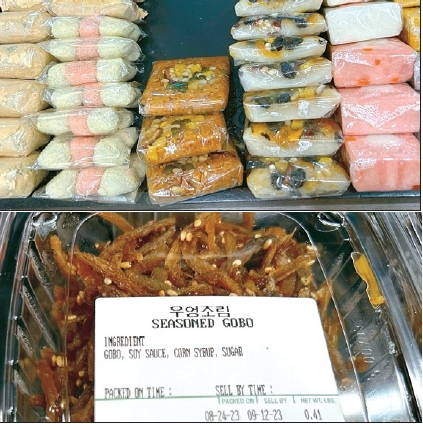
Recently, Surname Park had to visit the hospital after taking a bite of a sticky rice cake gifted to her at a Korean American business event. The rice cake contained both walnuts and pine nuts. Allergic to walnuts, Park spat it out immediately. However, she soon developed a rash that spread from her face to her body, and she had difficulty breathing. She promptly dialed 911 and was sent to the emergency room where she underwent treatment for over six hours. Even more than a month later, she is still grappling with the after-effects. Despite being cautious about her dietary choices, Park was unprepared for the absence of allergy warnings on the rice cake’s packaging.
There is a concerning lack of awareness regarding allergenic ingredients, such as nuts, within LA Koreatown’s food industry.
The Korea Daily recently reviewed food labels in Koreatown’s restaurants, supermarkets, and rice cake shops. They discovered that many rice cakes, side dishes, and other foods did not provide warnings or labels related to food allergies.
The Food and Drug Administration (FDA) identifies nine major allergens, which include items like milk, eggs, fish, and nuts. The Food Allergen Labeling and Consumer Protection Act (FALCPA), enacted in 2004, mandates that foods distributed nationwide specify whether they contain any of the FDA-acknowledged major allergens, particularly concerning factory-sealed, mass-produced items.
This is especially relevant for sesame seeds, which have been on the FDA’s list since January 1, as they are often used in Korean food, either as a side dish or in the form of sesame oil.
Yet, in local Korean grocery stores, many items like braised burdock roots and stir-fried fish cakes didn’t carry labels indicating the presence of sesame seeds. In other Korean supermarket chains, ingredients often either weren’t listed or weren’t clearly categorized under the FDA’s allergenic food groups. Even when they were, the print was often too tiny to be easily legible.
“I wasn’t aware that sesame seeds could cause allergies,” said a Korean supermarket official. “I’m not well-informed about the relevant regulations,” he added.
Rice cake stores aren’t exempt either. They often don’t specify what ingredients are in their rice cakes, or if they do, it’s often in small print that’s hard to read at a glance. Korean rice cake stores often contain nuts, including soybeans, walnuts, and peanuts.
For individuals like Park, for whom nuts are a frequent allergenic trigger, the lack of appropriate labeling reflects the community’s apathy towards the severity of allergies. Especially concerning is that while gift rice cakes might be attractively packaged, the individual wrappers seldom list potential allergenic ingredients.
Since the previous year, not only retailers but also eateries have been encouraged to inform consumers, either verbally or in writing, about allergenic contents in their foods. For restaurants, it’s not strictly a legal mandate, but non-compliance can lead to lawsuits. The FDA suggests methods like pamphlets, packaging, menus, labels, posters, and the like for allergen communication. The FDA also advises restaurants to equip their staff with a comprehensive list of menu ingredients and offer training on managing food allergies and preventing cross-contamination. It’s also recommended that each shift has a designated person to address customers’ food allergy-related queries.
However, eateries in Koreatown have shown negligence in allergy labeling. The Korea Daily found that 8 out of 10 restaurants surveyed did not list ingredients on their menus. Moreover, when the Korea Daily inquired if dishes contained allergens, many staff members appeared uncertain or puzzled, often responding with, “How can we note down everything?” While the presence of allergens varies between establishments, some commonly found ones include sesame, wheat, walnuts, and milk.
Non-compliance can result in penalties like fines, food recall orders, inventory disposal, and in case a consumer faces health issues due to insufficient allergy information, the establishment can be held liable for court costs and damages. Repeated or grave violations might even lead to business closure.
For consumers with allergies, it’s important to double-check what’s in the ingredients. Allergy symptoms can manifest as skin rashes, respiratory challenges, headaches, dizziness, and in extreme cases, can even be fatal.
BY HAEUN CHUNG [chung.haeun@koreadaily.com]



![Green card interviews used as decoy for ICE arrests U.S. Immigration and Customs Enforcement (ICE) agents arrest a man after a hearing at an immigration court in Manhattan, New York, on Oct. 27. [REUTERS]](https://www.koreadailyus.com/wp-content/uploads/2025/12/1226-ICE-100x70.jpg)
